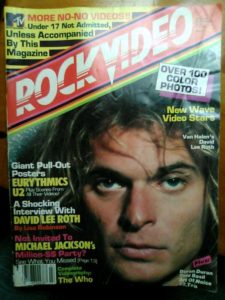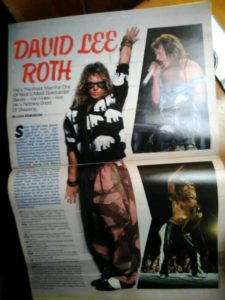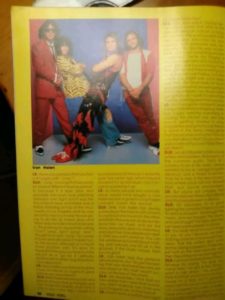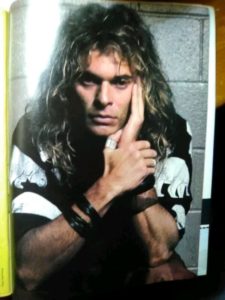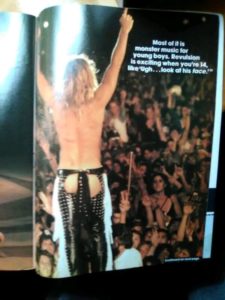Rock Video Magazine (July 1984)
He’s the front man for one of rock’s most spectacular bands – Van Halen – and he’s nothing short of shocking.
Since the last time David Lee Roth and I got together to talk, Van Halen had a #1 single (“Jump”) and their sixth consecutive, and most successful album (1984), to date. But don’t think that success has given Dave any more of a swelled head than he had before; this interview was conducted sitting on the floor of the dressing room bathroom backstage at Philadelphia’s Spectrum during Van Halen’s sellout U.S. tour. Dave had just finished doing his sword routine for the videotaping of the “Panama” video (which will accompany the release of the third single from 1984). He’d been working on that video since 11 a.m. that morning, had been up until five a.m. the night before, and had a show to do in two hours. Nonetheless, he was on a roll; a few ginseng tablets made the juices flow, the mouth move, and the words that came out were quintessential Dave.
Lisa Robinson: In a way, heavy metal music has become the biggest “cult” music in America, it has a big outlaw audience, and you are at the top of it. How do you feel about that?
DLR: I perceive that most of it is monster music for young boys. Revulsion is exciting when you’re 14, like “ugh…look at his face!”
LR: You mean like Ozzy Osbourne?
DLR: No, I mean like Michael Jackson. (Laughter).
LR: But let’s face it, this is the music that the parents hate, no?
DLR: It’s the loudest, it’s the fastest, it’s the most spectacular.
LR: Do you think it’s obnoxious?
DLR: Oh, very. That has a lot to do with growing up. I never grew out of it. I recognize it as a valuable asset.
LR: Did you ever think there would come a time when Van Halen would become “fashionable?”
DLR: Well, the haircut and the clothes are all wrong, but the music is perfectly acceptable. They’re playing it on every Top 40 station is the new vogue in the 80’s anyway. I perceive of myself more as a Tarzan than a singer anyway. Did you ever see that John Cassavetes movie “The Tempest” where he goes to a Greek Island, and there’s a guy dancing on the top of the hill yelling, “Welcome, welcome, to my island!” That’s me.
LR: Were you surprised that you had a #1 single with “Jump”?
DLR: “Jump” is a song that we wrote for several different reasons, primarily because it is leap year and secondly, because I was watching television one night and it was the five o’clock news and there was a fellow standing on top of the Arco Towers in Los Angeles and he was about to check out early, he was going to do the 33 stories drop – and there was a whole crowd of people in the parking lot downstairs yelling “Don’t jump, don’t jump” and I thought to myself, “Jump.” So, I wrote it down and ultimately it made in onto the record, although in a much more positive vein. It’s easy to translate it the way you hear it on the record as a “go for it” attitude, positive sort of affair – I jog, therefore, I am, approach.
LR: Now Eddie says that he had the music for this for a couple of years before you recorded it?
DLR: Well, there are always bits and pieces of music that go flying by, you can never tell exactly what form it was in two years ago. I doubt if it sounded exactly the way it does this year two years ago when Edward played it for us, because I can’t imagine us passing it up.
LR: So many people who normally never would have bought a Van Halen record, or gone to a Van Halen concert, loved this record.
DLR: Well, Van Halen has always come down the beach with a torch in one hand and a sword in the other, and that’s the way we’ve always approached our music and our live show and particularly my interviews and I don’t see how people can resist. In 1984, you can’t avoid us. You can talk whatever you want about clothing and haircuts, but it’s all in the grooves. If the music moves, then you’ve got it.
LR: Van Halen had five platinum albums before, but I do get the feeling that your real hardcore fans are real proud of this most recent success, at the top of the charts…
DLR: Oh absolutely, I think that our fans realize that I need that money, Lisa, and if anybody can, I’ll for sure put it to good use, on their behalf!
LR: Does it worry you that you might be respectable now?
DLR: Well, who was it, George Bernard Shaw wrote that after all the years of being an outcast, or being an outsider, the worst possible fate had befallen him – now he was popular and everyone was applauding him and he was acceptable. That’s not something we ever considered. We’re not forging a specific image here; a lot of artists try to do that, and if you’re trying to be Jesse James and they’re writing you up as if you’re Louis Pasteur, I can see where you might lose some sleep over that. We never really sat down and decided what we were going to sell to the people – I’ve always been acceptable to myself, it’s damn time that the world figures it that way too.
LR: You have gone onstage for years being considered outrageous, tasteless, vulgar, wearing everything including the kitchen sink, and now you’re getting reviews in artsy magazines saying that you’re the only band in the heavy metal genre that has wit, style and humor? How do you feel about that? Do you think it was a case of if you can’t beat them, join them?
DLR: I would still prefer to think of us as witless and tasteless. Arch enemy of the common public. That’s all I wanted to be in life, really. I always wanted to be an outrage to public decency and a threat to women. And this is one of the few occupations where you’re not only allowed that, buy you’re encouraged.
LR: But you’re not unhappy that you’ve sold over three million albums and that people seem to like you…
DLR: Oh absolutely. It’s no good lighting the campfire if there’s no one to dance around it. We brought the music, and we brought the drums, and we brought the signs, and now we need some people to dance.
LR: You really never run out of things to say, do you? Because I’ve been noticing on some of your recent interviews that the writers don’t even bother asking a question, it’s like they just turn on the tape recorder and then they string your quotes together.
DLR: I’ve even started some of the interviews by saying: “I’m glad you came here, I’ve got a few things I want to talk about.” You wouldn’t think that that would throw an interviewer for a loop, but it generally does. I don’t know, on one hand, how can you expect any artist, or entertainer who’s spent 10 years or more on a small postage stamp stage in a theater or a bar refining their art, practicing their music over and over again, and all of a sudden they make it and boom, they whip a microphone in front of you and they say “what do you think?” The guy just spent a decade playing, not thinking, so he’s not going to be able to come up with too much to say. On the other hand, most musicians are mental midgets – not even that, I call them idiot savants – a savant is one of these kids who can’t even feed himself or bathes himself, he has people who work for him who do that – they do one thing extremely well.
LR: I forgot the original question. Which I think was your intention here. Oh, it was that you don’t ever run out of things to say…But you were doing this for 10 years and practicing what to say when they asked you, yes?
DLR: No, not really, it’s just that I perceive all of this as conversation. I perceive interviews as a way to talk to the public. I can talk right through you, to the public, and it makes sense to both of you.
LR: Did you try to find a sponsor for this year’s tour?
DLR: Yes. We had absolutely no compunction about trying to find a sponsor. They sponsor football on television, they sponsor everything, so why not sponsor Van Halen? So we went after a sponsor and tried to get them to put up some money and then we could be in their advertisements and help sell their stereos and their toothpaste or whatever, and nobody wanted us. I guess our image was wrong. So, we decided that we’ll be the first band to sponsor a company. So we took the logo from the Western Exterminator Company in Los Angeles – a little man with a top hat and a big hammer behind his back – and we put him on the T-shirt and the program and on the merchandise, and he is the tour logo. Along with the little baby on the cover of the 1984 album. I think those two things give you a pretty definitive illustration of what Van Halen is all about, and where we’re going.
LR: How do you feel about those bands who have begun to imitate you? Do you feel – and I cannot believe I’m asking this – but do you feel that you’ve set a style?
DLR: Well, Van Halen has absolutely changed the face of pop music as we know it permanently and forever.
LR: How?
DLR: Well, I know for a fact that to a small degree, we’ve bred a small legion of imitators, copycats, mimics, people who are using Van Halen for their prime and sole inspiration. But even more important than that, are all the people who are just disgusted and revolted by our music and our presence and our appearance and the way I do interviews, and they’ve been forced to come up with some very substantial musical alternatives to Van Halen type rock, and that’s why we have new wave.
LR: Now come on, you like some new wave music…if it can even be called that anymore.
DLR: I love some new wave music, I’m just explaining where it comes from. I’m talking about haircuts and shoes, more than anything.
LR: But you’re about a haircut and a show. Look, you’re sitting here wearing red leather shoes completely studded with red jewels, and you definitely have a hair style…
DLR: I know, sure…but I’m talking about the synthesizer and a drum machine…
LR: Well, you have a synthesizer on 1984, but it does sound warmer. What do you think it is about this record that made even you tell me that it was really the first Van Halen album that you liked to listen to for pleasure?
DLR: Well, I think there was a lot less mental pressure during the recording of this album. We recorded it over a period of a year or more, and I think during that year we must have spent – in the studio, actually working – I think at least two and a half, three weeks.
LR: That long.
DLR: There’s a sense of ease about this album that I don’t feel on the other albums.
LR: You’ve had six consecutive platinum albums, and you have achieved definite superstar status within the rock scene. Do you think there’s a chance that this could all stop tomorrow? You know, that you could put out a record and no one would buy it, or give a concert and no one would come. Or, do you think you really are so established now that the audience will stick with you?
DLR: it’s difficult to tell. Because I know what I do when I like a band or I’m interested in an artist and listen to the record and I really enjoy it and I go and see the show and I love it, and I think about it all the time and ever y time the record comes on the radio I think about the way they looked on stage and when they’re on a cover of a magazine I buy the magazine and I take it home and read it and that’s great and then they come out with a mediocre album and I say “The hell with you.”
LR: When was the last time that you felt that way with a band?
DLR: With the Stones. I vacillate depending on the artist. If they have a good live show I will always to see the live show, but as for buying the record just because it’s so-and-so, forget it.
LR: So you’re very conscious that the audience is fickle and that you could lose them
DLR: Absolutely, that’s why I feel no responsibility whatsoever to my fans.
LR: What???
DLR: Why should they feel any towards me? If I make a bum record, if I put out a lousy song, how can I possibly expect them to buy it?
LR: Are your song lyrics always about you?
DLR: Absolutely. All the songs are merely chapters in the world according to Dave. Dave as Dave sees it, Dave as others see Dave, what happened to Dave last night and how Dave feels this morning. You can give them titles, and seemingly change the scenario and the characters, but I don’t even have to look back in retrospect about it – I know it’s all about me and the people that are around me.
LR: How much time do you spend writing the lyrics?
DLR: I write them during the commercials. It took much longer this year, because I was watching cable.
LR: Don’t you think that shows a certain contempt for your audience?
DLR: Not at all, not at all. I think it shows a grave respect for spontaneity.
LR: Tell me about the sword routine. When did you start working on it, and actually, how much of it do you do in the show?
DLR: I started working on my sword routine months and months ago. It’s something that people spend years working on, it’s part of the Northern Chinese kung fu style called Pekkwar. It’s a very aggressive martial art. Anybody can spin a blade around, like in a figure eight, but it’s had to make it actually appear as if it’s an extension of your arm and to utilize it with the proper balance, the proper breathing, the proper emotional content. You can make 20 thousand people really feel it when you flip that thing around – provided you know what you’re doing. If you don’t then your elbows and your knees are going to hear about it.
LR: This is for all these kids who are just going to want to try it because they’ve seen you do it…
DLR: Yeah, I wouldn’t suggest just jumping out on the porch…
LR: With a knife…
DLR: …flipping a blade around.
LR: Was the “Jump” video a direct reaction to the complex “Pretty Woman” video which had trouble getting on TV?
DLR: No…the “Jump” video was a generic film, in that there was no concept involved. No props, no fancy lighting, nothing. In fact, we shot the thing for $600 on one hand held 16 millimeter Bolex.
LR: Good for you. It’s all gotten so out of hand
DLR: Well, some people can get away with very convoluted ideas and concepts
LR: Who? Name two.
DLR: Well, I’ve seen Bowie do it a couple of times…Duran Duran gets away with it occasionally…
LR: I don’t agree, but what I did like about the “Jump” video was that it looked as if the camera was positioned in one place and you were all sticking your faces in front of it…
DLR: Exactly. It’s like mugging in the mirror.
LR: Why doesn’t Van Halen travel on a private plane?
DLR: After taking X amount of hours in ground school in flying, I’m more terrified of flying than ever before.
LR: Because now you know more about it and the more you know about it the more frightened you are, I know. As who wouldn’t be?
DLR: So what we have is a custom coach that looks like an airplane inside, it’s covered with brown leatherette and has a big brass falcon in the front. The interior contains three different stereos, a microwave over, a Betamax, a VHS, hot and cold running water, a refrigerator, 11 very comfortable bunks…
LR: I’ve been on that bus, I couldn’t sleep…
DLR: You get used to it. And I just had the entire thing re-upholstered in black and white zebra skin.
LR: Why do you talk about microwaves as a plus? It’ll give you cancer.
DLR: I’m afraid that my friends will give me cancer more than I’m afraid of that little black box.
LR: Really? Which friends are those? Nevermind, don’t tell me. Let me ask you this. What’s the thing you like the least about all of the success that you’ve had in Van Halen?
DLR: I think the fact that people will approach you armed with serious pre-conceptions, and love to substantiate those pre-conceptions through their conversation. Like asking pointed questions to which there are no real answers, all you can do is substantiate what they’re asking. Like, “So, Dave, what about all the girls backstage?” There’s no way out of that. Yeah, there’s a lot of girls backstage.
LR: But you encourage that. You constantly talk about it, you brag about it, you show pictures of your hotel rooms that look like hedonistic, sybaritic dens…
DLR: I didn’t know it was sybaritic hedonistic, I just thought it was the pad…
Interview © 1984 Rock Video Magazine

